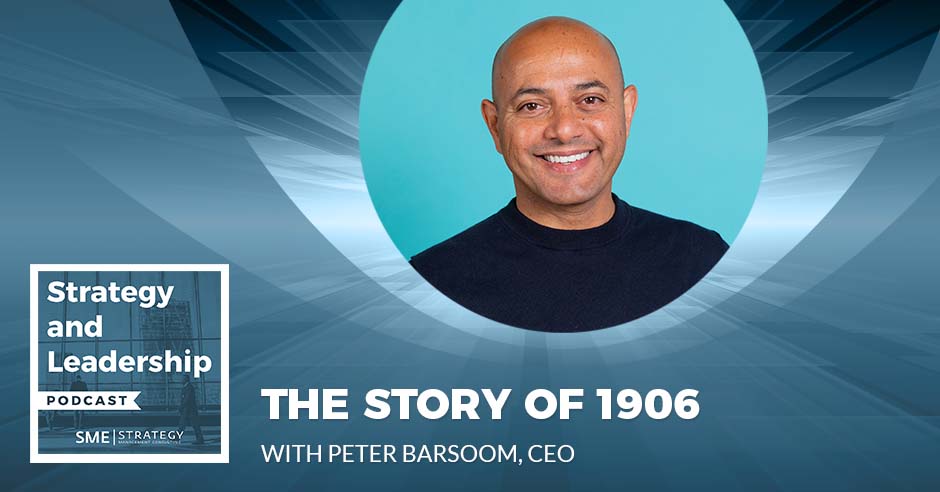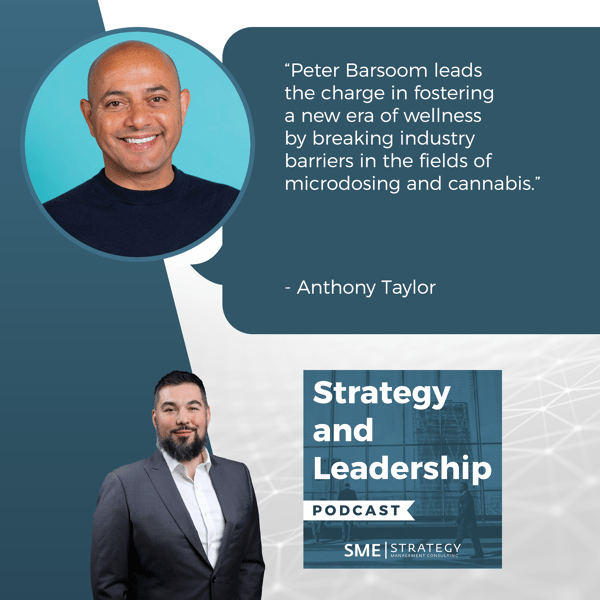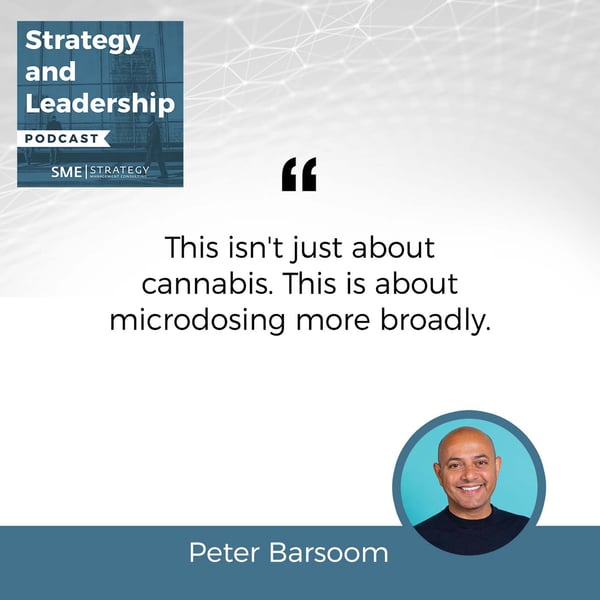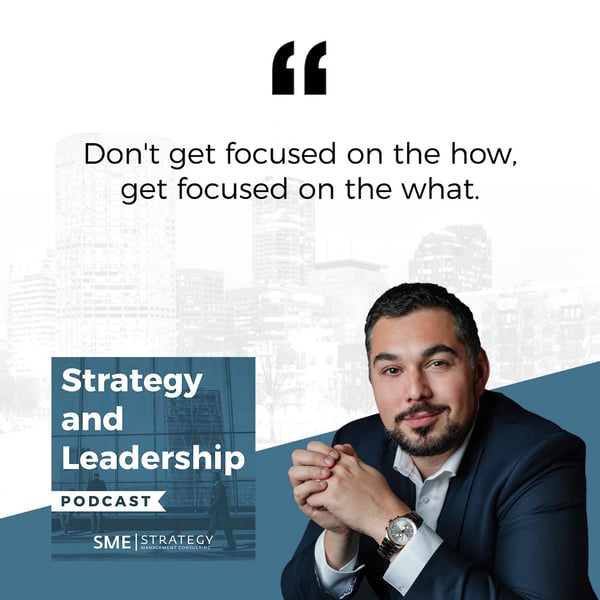
1906 is making microdosing more accessible and legal, opening the door to a new era of wellness. In this episode, we hear how CEO Peter Barsoom leads the charge, reshaping industries, one drop at a time. Explore the evolution of 1906 from its roots in the cannabis industry to becoming a leader in microdosing. Peter discusses 1906, how it is about more than just cannabis. He discusses redefining microdosing, bringing up the end of prohibition and the launch of a new direct-to-consumer platform. Find out how the company is making federally legal, microdosed cannabis accessible and breaking down industry barriers. Tune in now!
Listen on Spotify: https://open.spotify.com/episode/28pDY0oqT8L2KankeypP6r?si=DG8a6tMTSLKB6snkDcjf_w
Listen on Apple Podcasts: https://podcasts.apple.com/ca/podcast/the-story-of-1906-with-ceo-peter-barsoom/id1202449526?i=1000643338674
Want to continue the conversation with other leaders around the world? Join our Strategy and Leadership community.
https://strategy-and-leadership.mn.co/
► Subscribe to our channel for weekly videos on strategy & leadership: https://www.youtube.com/channel/UCOHLNRrpk3rGUdg7qUQjiog/?sub_confirmation=1
➡️ Looking for a sample agenda for your strategic planning offsite? https://www.smestrategy.net/blog/sample-strategic-planning-agenda
// Connect with us:
► Contact us: https://www.smestrategy.net/contact
► Connect with Anthony on LinkedIn: https://www.linkedin.com/in/anthonyctaylor604/
// About SME STRATEGY CONSULTING:
SME Strategy is a management consulting firm that specializes in helping organizations develop and implement their strategic plans. We work with teams to facilitate conversations about strategic direction and business strategy so that our clients can focus their energy on what will move them forward faster.
► Work with us: Are you looking for someone to facilitate your strategic planning process? https://www.smestrategy.net/strategic-planning-facilitator
► Check out our Strategy & Leadership Podcast: https://open.spotify.com/show/4yND4JKofh64gcvyvcLMqW
► Check out our online course on how to successfully lead your next strategic planning process: https://courses.smestrategy.net/
---
Watch the episode here
Listen to the podcast here
The Story Of 1906 With CEO Peter Barsoom
Blue Ocean Opportunities In The Cannabis Industry
In this episode, my guest is Peter Barsoom. He was formerly on Wall Street in Finance and is the Cofounder and CEO of 1906. Peter, how are you?
I'm fantastic, Anthony.
That's awesome. I'm excited to chat and look at your journey moving from finance into something super structured and then evolving into the industry that 1906 is in. Before I ask you some questions, why don't you tell our audience a little bit more about you and what your company does?
I'm the Cofounder and the CEO of 1906. 1906 was built on the belief that many people are looking for alternatives to alcohol and pharmaceuticals and how they manage the demands of daily life. Cannabis has been known throughout human history to provide benefits for a wide variety of different health and wellness conditions. It has been very difficult to access cannabis, particularly in a medicinal format.
1906 was built on the belief that people were looking to use cannabis not for smoking and getting high but rather as an alternative to alcohol and pharmaceuticals in how they manage the demands of daily life. That's the role that we fit in. Giving people an opportunity to experience cannabis in a safe, accessible, legal way that is fast-acting and targeted opens up a whole new world of how to not just consume cannabis but manage your mental health and wellness better.

We're not pro or anti-cannabis on the show. We want to focus on the leaders behind it. One of the cool things I thought about your story is your involvement in a role as a strategy consultant and then moving into this space that has so much opportunity and is always changing because of consumer demands, beliefs, and perceptions, the regulatory environment, and your product alternatives. It's so interesting to see where society is moving into its deeds and demands. Before I ask you about how the product fits, how the industry fits, and the evolution of the company, I'd love to hear some of your thoughts as a strategist.
How do you use strategy? What are some of the things that our audience should consider as they’re developing their strategy and thinking about innovation? I'll preface that we talk about strategic planning. We facilitate strategic planning sessions and it is largely in the process of getting alignment. I don't think we talk a lot about the blue ocean strategy. With how you have that product positioning and pricing alternatives, we don't get into that kind of thing. I'd love to hear any of your thoughts on how you view creating a strategy for an organization like yours.
I had the fortune of starting my career as a strategy consultant first. I had an opportunity to learn the discipline of strategy consulting, bringing it to bear for large institutions. In the cannabis market, we've got a very interesting opportunity to bring together so many different disciplines as strategists here because we’ve got a market that at one level is very old. People have been consuming cannabis since the beginning of human history. Whether it was legal or not, cannabis consumption has stayed with us.
At another level, we’ve got a new market as well with new distributions, products, and ways of positioning and pricing. As a strategist, the ability to operate in that nexus of taking an industry that is new but built upon some solid foundations of consumer demand and interest and being able to innovate so quickly in such a short period, frankly, is a strategist's dream. That is because you get to try different things and get feedback relatively quickly. You get to identify which segments of the market you want to focus on.
For instance, if you were a flower producer cultivator, you might be looking into how to gain market share within existing cannabis smokers. We were looking at it as, “How do we attract new people into this existing marketplace here?” We have an opportunity to continue to rethink how we are doing things and approach the challenges of cannabis as well from a de-stigmatization perspective. It has been a great learning experience. It is a strategist’s dream.
I like solving problems and doing that stuff. I could see having fun in that type of scenario. The company has been around for several years. You've had to go through iterations. I don't know how you view it if you've viewed it in phases, the de-stigmatization, acceptance, or product marketing. Without giving away too much information or any secret sauce, can you tell us about the evolution of the company from a strategist’s perspective?
We started the company back in 2015. Colorado and Washington had been open for a year in terms of adult use legalization. We saw a big gap in the marketplace that much of the market was serving the high dose heavy user consumers there, whether it be with high potency flowers or edibles that were very strong and sometimes inconsistent.
There were three major problems for adults. One is that if you don't want to smoke, there are three problems with what the edibles industry had at the time. You have no idea how it's going to make you feel. It takes way too much time to affect you and you don't know how long it's going to last. Third is that it's often made with poor-quality ingredients and things that you don't necessarily want to put into your body.
Our belief was that there is a large and growing segment of adult consumers who want to use cannabis in a functional way. Our belief was that if we could solve these three problems, making it fast-acting, delivering a specific effect, and making it appealing to your body, we could open up large segments of people who are looking to supplement or supplant their spending and focus on large categories of health and wellness.
There is a large and growing segment of adult consumers who want to use cannabis in a functional way.
We looked at it as, “Look at how much people spend and are concerned with conditions like insomnia, anxiety, depression, focus, sex, and energy.” These are all the things that people have been using cannabis for since time immemorial. They represent some of the largest areas of mental health and wellness spending. What's cool is that it cuts across from pharmaceuticals to natural products. If we take a look at simply the category of sleep, people have so many different options. Yet, we still have an epidemic of insomnia.
It is a major problem that people aren't getting good quality sleep despite how much money is being spent and the participation of pharmaceuticals. You can get from Ambien to chamomile tea. There are solutions being proffered there for sleep. Long story short, that was the focus of what we wanted to go after. We moved out to Colorado because that was the first legal state. We had a big uphill battle because the belief at the time was that this was a stoner market. The only thing people want is cheap, potent weed.
We came in and were the first brand that was fast-acting, science-based, and low-dose. We had quite a lot of stigmas that we had to overcome even in the industry itself. The first generation of 1906 was all about proving that there are consumers who want low-dose, fast-acting edibles that deliver a specific effect and that they’re willing to pay a premium for. That's what we had to prove out in the Colorado market, which we did with lots of elbow grease and hard work.
One thing I want to highlight is that I'm being mindful of our audience. They might have their stigmas and beliefs about cannabis but the same approach that you took could have been applied to apple juice, chocolate, or anything like that. What's interesting to reflect on for anybody either already in a business or looking at creating a new market is that the key to new product innovation is finding a solution to a problem where no solution exists or the alternative has big enough problems that it is unfavorable for certain people. I have friends who are innovating in the field of toilet paper, locks, and a bunch of things like that because there's a core gap in the market.
I assert that through your subject matter expertise and the opportunities, you did your market analysis and said, “This is not only an area but a product for innovation. Here is where we can disrupt it.” Despite the fact that there is an overwhelming need, the biggest challenge isn't necessarily that the product is good or workable. It's the product market fit and then the perception of the product, like the new Coke or whatever it is. That was version one, de-stigmatization and product market fit. You're in Denver. Let's keep it going.
We always started with the belief that the right way to approach this is to ask the two questions, “How is it you want to feel? How is it you want to consume?” People walk into a dispensary because they have a particular state that they want to achieve, not because the consumption method is primary. The problem is in the industry, we got it all backward. You walk into a dispensary and the dispensary is all organized by, “Here are the flowers, vapes, and edibles.” That's not the way consumers shop.
Consumers come in with a need state that they want to address. They are like, “I have anxiety. I am an insomniac. I'm feeling the blues.” The next question for us was, “If we talk about cannabis as medicine, why are people eating it as candy all the time? What is with this proliferation of sugary gummies with gluten, gelatin, other allergens, and calories? Why is that the primary way in which we're distributing cannabis as medicine?” That, to us, was bizarre. If we talk about cannabis as medicine, it's not available in a medicinal format. What is the most universal medicinal format? It's a pill.
Consumers come in at edibles stores with the need state that they want to address.
Here's another way in which it's important for a strategist to look at the data but also ignore the data. If you looked at the data, you would've said, “Eighty percent of the market is gummies and then the rest is chocolates and topicals.” Pills were sub 1% of the market. If you looked at the data, you'd never say, “We should get into the pill market.” For us, we looked at it differently, which is, “This isn't about the cannabis market. This is about the consumer.”
If you look at the consumer, the consumer is taking pills and capsules all day long. America is a society that uses pills quite widely. We don't have a consumer problem with people taking pills. It so happens that this industry doesn't offer that format. We were looking at a number of different product formats. We were developing a drink and a vape, and working on a gummy and a pill all simultaneously.
As we got into the area of pills, we had a number of different observations. Number one is that most people don't like pills in the way it's marketed and packaged up. It's not an exciting thing the way you might be excited about opening up your can of Coke that you love, for instance. Rarely do people get excited about going into their purse, grabbing that plastic prescription bottle, opening it up, and being like, “It's going to be a great day when I pop this pill.”
It depends on what kind of pills but yes.
Cannabis is also about pleasure. It's not just about health and wellness. The challenge that we set ourselves was, “Let's rethink this whole thing about pills and the shape of it so that it's appealing from a shape. It's easy to swallow. It's colored so you know which one it is. Let's call it something different than a pill because pills have a stigma. Let's call it drops and it's shaped like a drop. Let's not package it in an ugly plastic pharmaceutical container but in a beautiful recyclable and sustainable tin with the name clearly on it.”
Is it like an Altoid tin versus a blister pack?
Exactly, except it is longer and not flat like an Altoid tin. Let's change the whole way in which we think about our relationship with pills. While pills have caused a lot of damage, whether it be the opioid crisis or other things like that, there's nothing wrong with the format of the pill. It's the intentions and the people behind it. It is the healthiest way to consume cannabis. It has no sugar and calories. It's vegan. It's gluten-free. It's medicine all in there.
There's nothing wrong with the format of the pill. It's the intentions and the people behind it.
If people want a gummy, that's great but that's candy. That involves whole other flavors and factors. If we're going to make cannabis accessible, which is what our core mission is, then we have to deliver it in the most accessible format. The most accessible format across humans is a pill that you can swallow. That was our big product innovation. When we launched that in January 2020, it became an instant hit. We were like, “We cracked this code.”
There are a couple of things I wanted to touch on. Time flies when you're having fun. One is the outcome versus the feature. When we talk about mission statements with teams, they get so focused on the how that they forget about the why. The purpose isn’t the outcome that you are selling. You had brought it back to the mission for people. The other thing was how you're changing the packaging and effective delivery of it. It's so interesting. It made me think of nootropics.
Nootropics weren't a thing several years ago. Now, people are taking performance-enhancing things for work as you would take a Gatorade, a liquid IV, or whatever else is there. Moving into that category is smart because you're moving out of recreational drugs and more into performance health. That's super smart. We're running low on time. We talked about version 1 and version 2. You're in version 3. My question is what are you looking forward to? How can people connect with you and learn more about it? What's next for the company? What are you excited about? What's on the horizon?
What’s exciting is that we are seeing the end of prohibition. We launched our direct-to-consumer platform, which allows us to sell 100% federally legal microdosed 1906 products with 2 milligrams of hemp-derived delta-9 THC. You can buy it online at 1906.shop. Put it in your credit card and have it shipped directly to your home via US Postal Service. This is the end of prohibition.
We are the leader in microdose cannabis in the retail dispensary channel. This allows us to grow and meet consumers where they want to be met. We’ve had to open up market by market and state by state. We’ve opened up 11 markets but that’s still 39 states that people couldn't access safe, legal cannabis from 1906. Our strategy going forward is going to be an omnichannel strategy. Similar to the beer liquor distinction, higher potency products are going to be offered in the dispensary channel. Those are going to be in the markets that we operate in. You can have microdosed 1906 products delivered directly to your home.
We think that this is a game-changer for consumers, first and foremost, that they can get safe, federally legal cannabis medicine delivered directly to their doorstep. This is a game-changer for 1906 and the rest of the industry as well. We get to tap into whole new segments of consumers. Those are people who are in Texas who don't have access to legal dispensaries to people who are in legal states but they, for one reason or another, don't want to drive to a dispensary or because those dispensaries often serve higher potency products.
Finally, the next thing we're excited about is this isn't about cannabis. This is about microdosing more broadly. As we are seeing, there is a big movement in health and wellness about microdosing of other substances. You can expect that we're going to be an active player in the broader microdosing movement not just limited to cannabis as well. We expect and hope to be not just the number 1 microdose cannabis brand but the number 1 microdose psilocybin and mushroom brand once that becomes legal.

I'm a Canadian. Pharmaceuticals are done differently here. We don't have the same kind of monopolistic structure of pharmaceuticals, the culture of it, and the whole. It's so interesting. If you look at it as a contrast to Eastern and Western medicine and how people use natural products for that, they are culturally way more accepted compared to the war on drugs from the '19-whatever before my day. That's cool.
What I appreciated from our conversation is how tactical and strategic you were at saying, “Let's look at this market. We've got some expertise. Let's create a space for us. Let's innovate across all levels and bit by bit and layer by layer look at what we're doing.” You're setting up the distribution channel. It's cool. For those of you who want to be able to borrow these skills, the Business Model Canvas is a fantastic tool.
Spend some time with the Business Model Canvas. It will work you through each of those individual steps to help you think about it. You don't need to hire a strategy consultant but you could bring some smart strategists onto your team. You already mentioned where they can purchase your product. Where can they connect with you and learn more about 1906 as an organization?
You can reach us through a number of different channels. Our website is 1906.shop. Our Instagram is @1906NewHighs. You can email me directly. I'm Peter@1906NewHighs.com. If you want to reach us, it’s in any way. DM us, email us, text us, or email me.
Peter, thanks for joining me on the show. It has been fun. It was cool to hear about your journey. All the best moving forward.
Thank you. Take care.
You too.
‐‐‐
My guest for this episode is Peter Barsoom who is the Cofounder and CEO of 1906. One of the cool things I appreciate about this from a strategist’s lens is being able to look at new product innovation, how to solve products that consumers have, and how to meet their needs. Don't get focused on the how. Focus on the what and the problem statement. It is also recognizing from a strategic perspective that it takes time and there are multiple layers to it.

We talk about change management a lot in strategic planning, getting people on board, and recognizing that as you go through it, there are new challenges along the way. What's great in Peter's case is that these new challenges probably have a big pot of gold at the end of it but it's also beneficial for society and all people involved.
I'm excited to see how it goes. I encourage you as the audience to see how you can innovate and put more structures in place to capture those new markets that don't even exist. Don't get dissuaded because nobody's doing it. Nobody's doing it because it might be hard. It doesn't mean it's not a good idea. Thanks again for reading. Be sure to share this episode with somebody who might enjoy it. I'll see you next time.
Important Links
- 1906
- @1906NewHighs - Instagram
- Peter@1906NewHighs.com
About Peter Barsoom
 Peter Barsoom is the CEO and Co-Founder of 1906, a leading cannabis company producing the country’s #1 cannabis pill. The company’s collection of patented, fast-acting, pharma-grade capsules combine a low dose of THC, CBD and other effective medicinal plants to deliver a functional, targeted effect for daily use. Prior to founding 1906 in 2015, Peter had an extensive career in finance and business strategy, holding senior management positions at American Express, Merrill Lynch, Morgan Stanley, Blue Mountain Capital and Intercontinental Exchange.
Peter Barsoom is the CEO and Co-Founder of 1906, a leading cannabis company producing the country’s #1 cannabis pill. The company’s collection of patented, fast-acting, pharma-grade capsules combine a low dose of THC, CBD and other effective medicinal plants to deliver a functional, targeted effect for daily use. Prior to founding 1906 in 2015, Peter had an extensive career in finance and business strategy, holding senior management positions at American Express, Merrill Lynch, Morgan Stanley, Blue Mountain Capital and Intercontinental Exchange.


